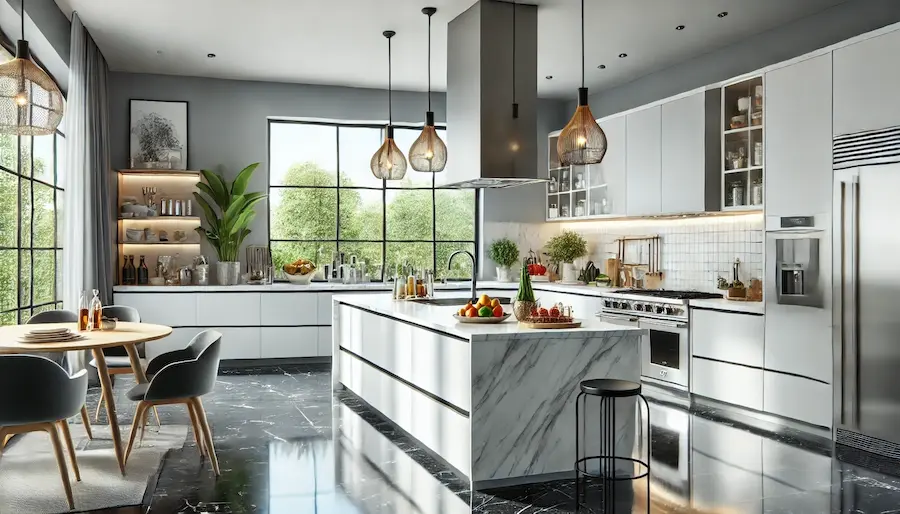Modern kitchens have evolved into multifunctional spaces that blend aesthetics with functionality, reflecting technological advancements and changing lifestyles. This article explores the history, key features, applications, and considerations when choosing a modern kitchen design.
Introduction to Modern Kitchens
A modern kitchen is characterized by sleek designs, innovative materials, and efficient layouts that prioritize functionality and style. Unlike traditional kitchens, modern designs often feature open floor plans, minimalist aesthetics, and state-of-the-art appliances, making the kitchen a central hub for cooking, dining, and socializing.
History and Origins of Modern Kitchens
The evolution of the modern kitchen began in the early 20th century with designs like the Frankfurt Kitchen, created by Margarete Schütte-Lihotzky in 1926. This design emphasized efficiency and functionality, laying the groundwork for contemporary kitchen layouts. Post-World War II advancements introduced new materials and appliances, further shaping modern kitchen designs. The late 20th and early 21st centuries saw the rise of open-concept kitchens, integrating cooking spaces with living areas to accommodate changing social dynamics.
Key Features of Modern Kitchens
- Sleek and Minimalist Design: Modern kitchens often feature clean lines, flat-panel cabinetry, and a lack of ornate detailing, creating a streamlined appearance.
- Innovative Materials: The use of materials like stainless steel, engineered quartz, and eco-friendly options contributes to both functionality and aesthetics.
- Open Floor Plans: Integrating the kitchen with living and dining areas fosters a more inclusive environment, facilitating interaction and multitasking.
- Advanced Appliances: Incorporating the latest technology, such as smart ovens and energy-efficient refrigerators, enhances convenience and sustainability.
- Functional Layouts: Design principles like the kitchen work triangle optimize the placement of the sink, stove, and refrigerator to improve workflow efficiency.
Applications of Modern Kitchens
Modern kitchens are versatile spaces that serve multiple functions beyond cooking:
- Culinary Activities: Equipped with high-end appliances and ample counter space, modern kitchens cater to both everyday cooking and gourmet meal preparation.
- Entertainment: Open layouts and large islands provide space for hosting guests, making the kitchen a focal point for social gatherings.
- Family Interaction: As a central hub, the modern kitchen facilitates family activities, from shared meals to homework sessions.
- Workspaces: With the rise of remote work, kitchens often double as temporary home offices, offering a functional environment for productivity.
Considerations When Choosing a Modern Kitchen
When planning a modern kitchen, consider the following factors:
- Space and Layout: Assess the available space to determine the most efficient layout, ensuring ease of movement and accessibility.
- Material Selection: Choose durable, easy-to-maintain materials that align with your aesthetic preferences and budget.
- Appliance Integration: Select appliances that meet your cooking needs and consider built-in options for a seamless look.
- Lighting: Incorporate a combination of task and ambient lighting to enhance functionality and ambiance.
- Budget: Establish a clear budget to guide your choices in materials, appliances, and design services.
Conclusion
Modern kitchens are a testament to the fusion of form and function, adapting to contemporary lifestyles while offering efficient and aesthetically pleasing environments. By understanding their history, key features, and applications, and by carefully considering design elements, you can create a modern kitchen that serves as the heart of your home.
